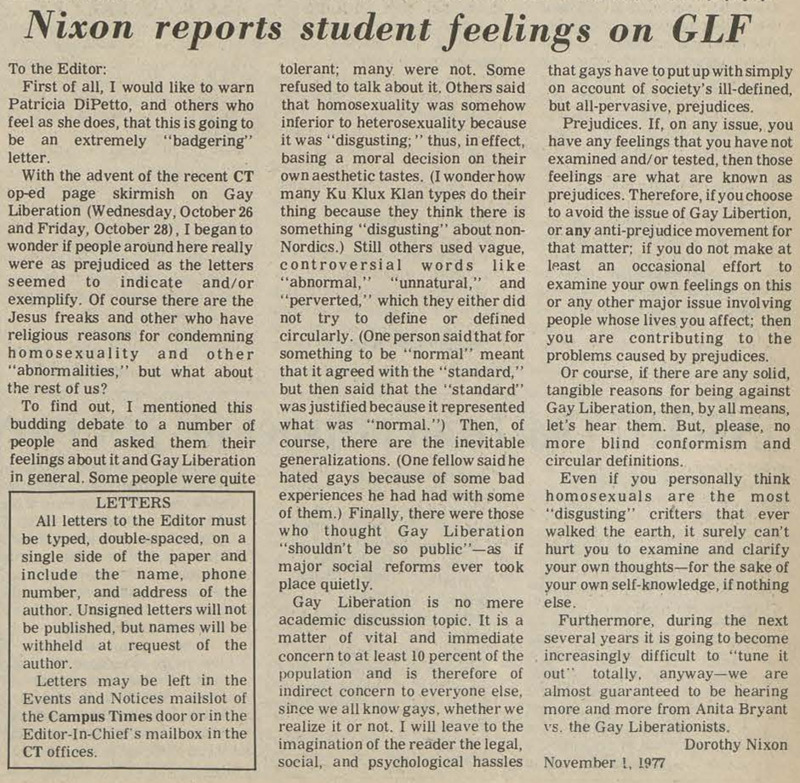-
Title
-
Nixon reports student feelings on GLF
-
Description
-
Letter to the editor discussing the general campus opinions about Gay Liberation, ranging from tolerant to completely averse.
-
Creator
-
Campus Times
-
Date
-
1977-11-02
-
Format
-
Newspaper
-
Language
-
eng
-
Publisher
-
University of Rochester
-
Rights
-
This Item is protected by copyright and/or related rights. You are free to use this Item in any way that is permitted by the copyright and related rights legislation that applies to your use. For other uses you need to obtain permission from the rights-holder(s). http://rightsstatements.org/vocab/InC/1.0/
-
Source
-
Campus Times (November 02, 1977), Campus times (University of Rochester), LD4747.C197, Rare Books, Special Collections, and Preservation, River Campus Libraries, University of Rochester
-
Text
-
To the Editor:
First of all, I would like to warn Patricia DiPetto, and others who feel as she does, that this is going to be an extremely "badgering" letter.
With the advent of the recent CT op-ed page skirmish on Gay Liberation (Wednesday, October 26 and Friday, October 28), I began to wonder if people around here really were as prejudiced as the letters seemed to indicate and/or exemplify. Of course there are the Jesus freaks and other who have religious reasons for condemning homosexuality and other "abnormalities," but what about the rest of us?
To find out, I mentioned this budding debate to a number of people and asked them their feelings about it and Gay Liberation in general. Some people were quite tolerant; many were not. Some refused to talk about it. Others said that homosexuality was somehow inferior to heterosexuality because it was "disgusting; " thus, in effect, basing a moral decision on their own aesthetic tastes. (I wonder how many Ku Klux Klan types do their thing because they think there is something "disgusting" about non Nordics.) Still others used vague, controversial words like "abnormal," "unnatural," and "perverted," which they either did not try to define or defined circularly. (One person said that for something to be "normal" meant that it agreed with the "standard," but then said that the "standard" was justified because it represented what was "normal.") Then, of course, there are the inevitable generalizations. (One fellow said he hated gays because of some bad experiences he had had with some of them.) Finally, there were those who thought Gay Liberation "shouldn't be so public"—as if major social reforms ever took place quietly.
Gay Liberation is no mere academic discussion topic. It is a matter of vital and immediate concern to at least 10 percent of the population and is therefore of indirect concern to everyone else, since we all know gays, whether we realize it or not. I will leave to the imagination of the reader the legal, social, and psychological hassles that gays have to put up with simply on account of society's ill-defined, but all pervasive, prejudices.
Prejudices. If, on any issue, you have any feelings that you have not examined and/or tested, then those feelings are what are known as prejudices. Therefore, if you choose
to avoid the issue of Gay Libertion, or any anti-prejudice movement for that matter; if you do not make at least an occasional effort to examine your own feelings on this or any other major issue involving people whose lives you affect; then you are contributing to the problems caused by prejudices.
Or course, if there are any solid, tangible reasons for being against Gay Liberation, then, by all means, let's hear them. But, please, no more blind conformism and circular definitions. Even if you personally think homosexuals are the most "disgusting" critters that ever walked the earth, it surely can't hurt you to examine and clarify your own thoughts—for the sake of your own self-knowledge, if nothing else.
Furthermore, during the next several years it is going to become increasingly difficult to "tune it out" totally, anyway—we are almost guaranteed to be hearing more and more from Anita Bryant vs. the Gay Liberationists.
Dorothy Nixon


